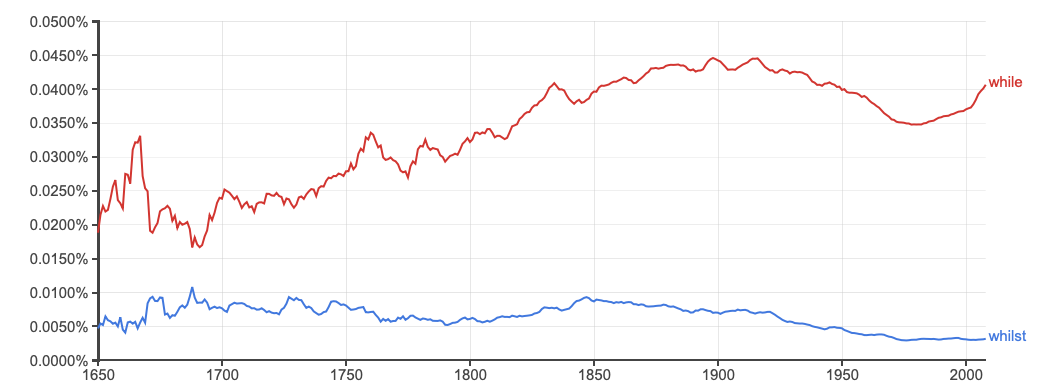
Is Whilst the Handlebar Mustache of Modern English?
2019-10-19
I read an embarrassing amount of stuff on-line, Reddit, Medium, blog posts, links from Hacker News. In the last few years I’ve noticed a strange trend: the resurgence of the word “whilst” in casual writing and conversation—or really any writing and conversation. What was this word that went out of style with early nineteenth-century romantic poets doing in blog posts in the early twenty-first century?

At first I wrote off this phenomenon off as yet another sepia-toned retro affectation from a generation that delights reviving trends and fashions that were passé when their grandparents were born. But people told me otherwise. No, they said, “whilst” has always been in common usage in Britain, or at least England, and now it is taking off across the English-speaking world, because Internet. This page from writingexplained.org even goes so far as to claim “whilst is common in formal British English,” and grammarly.com claims “typically, Brits use whilst and Americans use while.”
Okay, that doesn’t sound unreasonable. Except, I’ve been around a while, and I’ve read a lot, including a fair amount of stuff by British writers. I loved Tolkien, and C. S. Lewis, and Lewis Carroll. As a kid I had this children’s (or now young adult?) book called The Borribles by Michael de Larrabeiti, it is set in London in the middle twentieth century—I read it so many times that I broke the spine. I’ve also traveled to the UK a few times, and in my first couple of years of grad school I had my ass kicked at pool on a near-daily basis by a couple friends from England. I also grew up in a family where weird quirks of language were common dinner table conversation topics. I have known for a long time that Brits stick a spurious “u” in words like “color”, “flavor”, and “neighbor”, and add an extra “i” to “aluminum”. I know that over there a lift is an elevator, and the pavement is the sidewalk. I know that tea is a drink but it’s also a meal. I know that a biscuit is a cookie, except when it’s a cracker. Chips are fries, and crisps are chips, except when they’re crackers. I know that the underground is a subway while a subway is a tunnel that you walk through to go under a street or railroad. I know that a realtor is called an estate agent and a lawyer is called a barrister.
How is it possible, then, that I’ve missed the fact that Brits have been walking around saying “whilst” like they’re on a poetry retreat in the moors in 1805?
Maybe because they haven’t, really? Below I’ll show that, contrary to what the sages at writingexplained.org and grammarly.com think, “whilst” isn’t really used much, even in British books.
Even British writers don’t really use “whilst” very much.
I’m sure if I had been reading books that used “whilst” I would have noticed. Luckily, modern technology allows me to check. Kindle books are searchable, and Project Gutenberg has searchable plain text of tons of older books that have entered the public domain.
I did some data collection, taking a Totally Scientific™ sampling of British authors and translators over the last hundred years. (Plus James Joyce, who is Irish, not British, but Irish written English has a lot of similarities to British English, and I happened to have a digital copy of Ulysses.)
| Author | Work | Year | “whilst”s | “while”s | whilsts per while |
|---|---|---|---|---|---|
| Jane Austen | Sense and Sensibility | 1811 | 2 | 111 | 2% |
| Jane Austen | Pride and Prejudice | 1813 | 4 | 76 | 5% |
| Mary Shelley | Frankenstein | 1818 | 9 | 69 | 13% |
| John Keats | The Complete Works of John Keats | 1821 | 26 | 462 | 6% |
| Charles Dickens | A Tale of Two Cities | 1859 | 0 | 99 | 0% |
| Charles Dickens | Great Expectations | 1861 | 0 | 202 | 0% |
| Lewis Carroll | Alice’s Adventures in Wonderland | 1865 | 0 | 27 | 0% |
| Lewis Carroll | Through The Looking Glass | 1871 | 0 | 25 | 0% |
| Oscar Wilde | The Picture of Dorian Gray | 1890 | 0 | 19 | 0% |
| Joseph Conrad | Heart of Darkness | 1899 | 0 | 38 | 0% |
| Constance Garnett (translator) | Anna Karenina by Leo Tolstoy | 1901 | 0 | 352 | 0% |
| DH Lawrence | Sons and Lovers | 1913 | 35 | 108 | 32% |
| DH Lawrence | Women in Love | 1920 | 52 | 65 | 80% |
| James Joyce | Ulysses | 1922 | 2 | 158 | 1% |
| JRR Tolkien | The Lord of the Rings | 1954 | 0 | 500 | 0% |
| Michael de Larrabeiti | The Borribles | 1976 | 0 | 61 | 0% |
| Peter Mayle | A Year in Provence | 1989 | 0 | 71 | 0% |
| Don Bartlett (translator) | The Redbreast By Jo Nesbø | 2006 | 0 | 93 | 0% |
| —— | —- | —- | ——– | —— | ————- |
| Totals | 130 | 2536 | 5% | ||
| —— | —- | —- | ——– | —— | ————- |
What we see here mostly confirms my impression, “whilst” was used some by early 19th century romantics Austin, Shelley, and especially Keats. Then after that it seems to have been abandoned, except, oddly enough, by D.H. Lawrence, a hundred years ago. Other than Lawrence, none of the British novelists I happened to have available used “whilst” at all. I’d be very curious to see more data on more recent writers. If you have the Harry Potter series on your kindle, try searching “whilst” and “while” and see how many hits you get.
Ever so slightly more scientifically, we can take a look at Google Books N-gram Search. This great tool can show us the prevalence of words and phrases across all of Google Books’ library through time, comparing the frequency of different phrases, so we can compare “whilst” vs “while” worldwide and in British writing going back centuries.

Above is the historical frequency of “whilst” vs “while” in the British English corpus of Google Books from 1650 to 2019. Here we can see that “whilst” is actually at its lowest usage ever — both in absolute terms and relative to “while” — in British books. Given that there must be some population of books quoting Lawrence, Austin, Shelley, Keats and other older writers, it isn’t surprising that we’d see some usage.
The D.H. Lawrence anomaly
So what’s going on here? Personally, I think part of the surge of whilst-ing in blogs and tweets and Reddit posts does come from a current fashion for old things. Like handlebar mustaches and Decemberist songs, it’s cool these days to revive old stuff. Beyond that, I think that there is a sense among some Americans that anything British is inherently more sophisticated. There was this American kid who hung out with my English pool-shooting buddies. He adopted all their vocabulary and slang, and used it even when they weren’t around. Cool or pretentious? You decide.
But I think there may be something more going on as well, and those D.H. Lawrence stories may point toward an answer. Is it possible that the differences between what is considered “common” usage and what we see in books can be explained by differences in regional or social class dialects?
I’m now ranging into speculation. Most literature, especially in the nineteenth and early twentieth centuries, was written for—and often by—the educated upper classes. However, according to his Wikipedia page D.H. Lawrence was the son of a “barely literate miner”, and he wrote significantly about differences and relationships between the classes. Is it possible that “whilst” actually fell out of usage by the upper classes after the time of Keats, but was retained by the working class? The working class were, for the most part, not writing books, and even if they were they would likely have been revised to use more “proper” English by their editors.
This hypothesis is interesting. On one hand, the surge of usage on-line recently could be explained by the surge of writers of all classes onto the internet and social media in the last ten years. On the other hand, it doesn’t explain Dickens, who also wrote about relations between the classes, or de Larrabeiti, whose Borribles were clearly working class.
I don’t know. Ponder it whilst I read some more.